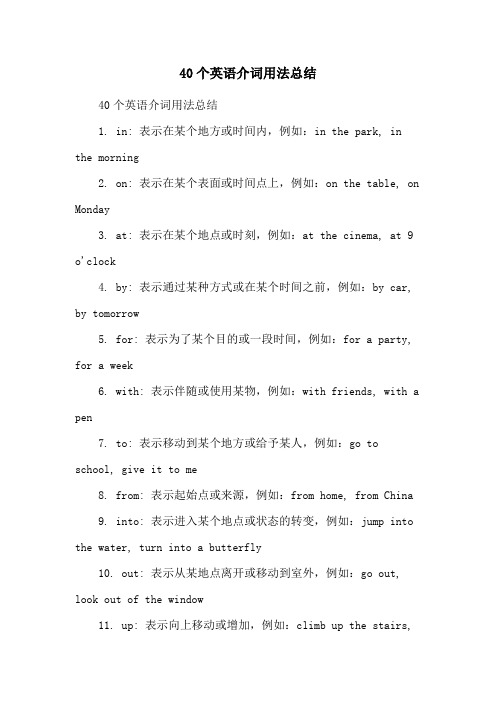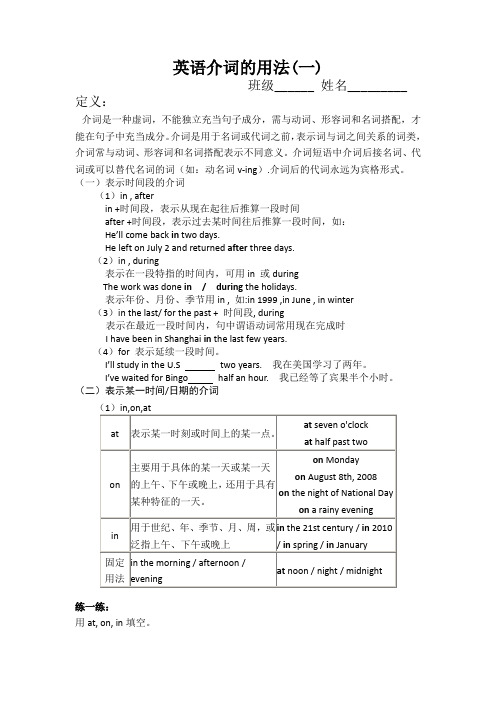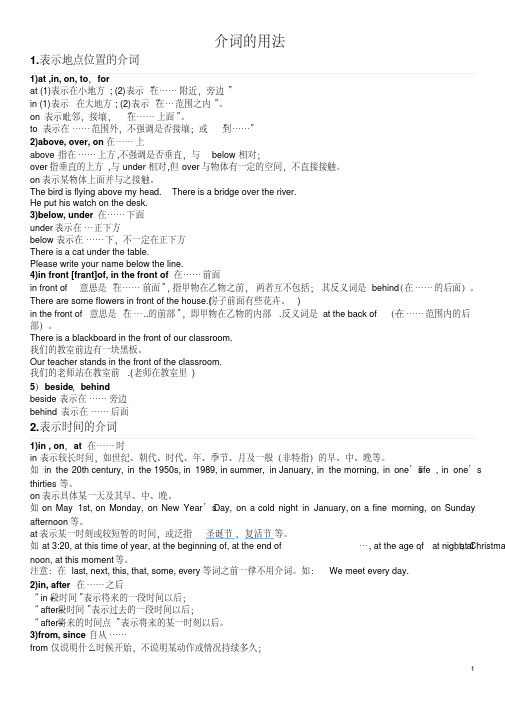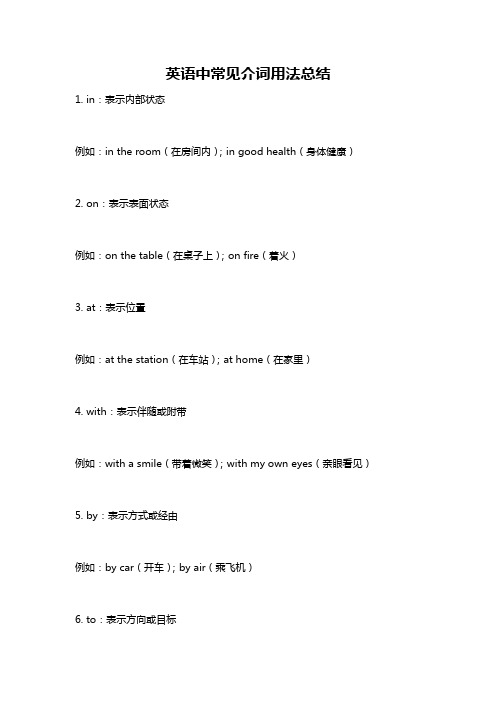英语中介词的用法
40个英语介词用法总结

40个英语介词用法总结40个英语介词用法总结1. in: 表示在某个地方或时间内,例如:in the park, in the morning2. on: 表示在某个表面或时间点上,例如:on the table, on Monday3. at: 表示在某个地点或时刻,例如:at the cinema, at 9 o'clock4. by: 表示通过某种方式或在某个时间之前,例如:by car, by tomorrow5. for: 表示为了某个目的或一段时间,例如:for a party, for a week6. with: 表示伴随或使用某物,例如:with friends, with a pen7. to: 表示移动到某个地方或给予某人,例如:go to school, give it to me8. from: 表示起始点或来源,例如:from home, from China9. into: 表示进入某个地点或状态的转变,例如:jump into the water, turn into a butterfly10. out: 表示从某地点离开或移动到室外,例如:go out, look out of the window11. up: 表示向上移动或增加,例如:climb up the stairs,wake up12. down: 表示向下移动或减少,例如:walk down the hill, calm down13. about: 表示关于某事或在某个范围内,例如:talk about the movie, wander about the city14. off: 表示离开或关闭,例如:get off the bus, turnoff the lights15. on: 表示打开或激活,例如:turn on the TV, switch on the computer16. over: 表示越过或在某地上方,例如:jump over the fence, fly over the city17. under: 表示在某物下面或被控制或影响,例如:hide under the bed, live under his rules18. with: 表示具有某种特征或和某人一起做某事,例如:a man with blue eyes, dance with me19. without: 表示没有某物或在缺乏某物的情况下,例如:go without food, live without regret20. by: 表示通过某种方式,例如:learn by doing, go by bus21. through: 表示穿过某物或完成某事,例如:walk through the door, go through the documents22. across: 表示横穿某物或在某个范围内,例如:swimacross the river, all across the world23. between: 表示在两个事物之间或在某个时间段,例如:choose between two options, between 9 and 10 o'clock24. among: 表示在三个或三个以上事物之间或在某群人中,例如:share among friends, discuss among colleagues25. around: 表示在周围或在某个时间点附近,例如:walk around the park, around midnight26. through: 表示通过某事物或在某段时间内,例如:read through the book, work through the night27. against: 表示反对或靠在某物上,例如:fight against injustice, lean against the wall28. for: 表示代表或支持某人或某事,例如:vote for a candidate, fight for freedom29. towards: 表示朝向某个方向或对某人有好感,例如:walk towards the beach, feel towards someone30. within: 表示在某个时间或范围内,例如:arrive within an hour, within the city limits31. beyond: 表示超出某个界限或超过某个程度,例如:beyond expectations, beyond the horizon32. along: 表示沿着某个路线或伴随某人一起,例如:walk along the street, sing along with the song33. above: 表示在某物之上或高于某个程度,例如:flyabove the clouds, above average34. below: 表示在某物之下或低于某个程度,例如:swim below the surface, below freezing35. beside: 表示在某物旁边或和某人一起,例如:sit beside me, beside the lake36. near: 表示在某物附近或接近某个时间,例如:live near the beach, near the end37. past: 表示经过某个地点或在某个时间之后,例如:walk past the store, past midnight38. around: 表示在周围或大约某个数量,例如:look around the room, around 20 people39. after: 表示在某个时间之后或追求某人或某事,例如:after dinner, run after the dog40. before: 表示在某个时间之前或在某个事件之前,例如:before sunrise, before the meeting这些介词是英语中常用的一些基本介词,它们在表达地点、时间、方式等方面起到了重要的作用。
英语介词的用法

英语介词的用法(一)班级______ 姓名_________定义:介词是一种虚词,不能独立充当句子成分,需与动词、形容词和名词搭配,才能在句子中充当成分。
介词是用于名词或代词之前,表示词与词之间关系的词类,介词常与动词、形容词和名词搭配表示不同意义。
介词短语中介词后接名词、代词或可以替代名词的词(如:动名词v-ing).介词后的代词永远为宾格形式。
(一)表示时间段的介词(1)in , afterin +时间段,表示从现在起往后推算一段时间after +时间段,表示过去某时间往后推算一段时间,如:He’ll come back in two days.He left on July 2 and returned after three days.(2)in , during表示在一段特指的时间内,可用in 或duringThe work was done in / during the holidays.表示年份、月份、季节用in , 如:in 1999 ,in June , in winter(3)in the last/ for the past + 时间段, during表示在最近一段时间内,句中谓语动词常用现在完成时I have been in Shanghai in the last few years.(4)for 表示延续一段时间。
I’ll study in the U.S two years. 我在美国学习了两年。
I’ve waited for Bin go half an hour. 我已经等了宾果半个小时。
(二)表示某一时间/日期的介词练一练:用at, on, in填空。
1. ________ five o’clock2. _________ a quarter past seven3. ________ February 11th4. _________ a hot summer afternoon5. ________ winter6. ________ the evening7. ________ night 8. ________ the morning of Children’s Day(2)before, bybefore 表示某一时间之前,而by 表示到某一时间止,句中谓语动词多用完成时态。
英语介词用法详解

英语介词用法详解英语介词是连接词与词之间关系的重要语法成分,它们用于表示空间、时间、关系等概念。
正确的使用介词是英语学习的基础之一。
本文将详细介绍英语介词的常见用法。
一、表示方向和位置的介词1. In(在):用于大的地点范围之内,表示“在……里面”。
- There is a book on the desk.- I live in New York.2. On(在、在上、在……上面):用于平面、表面或边界之上。
- The cat is on the table.- The painting hangs on the wall.3. At(在、在……附近):用于特定的地点或位置。
- I met him at the park.- We will meet at the restaurant.4. Under(在……下面):表示相对高度或遮挡。
- The cat is under the table.- He found his keys under the sofa.5. Behind(在……后面):表示在某物后面。
- The car is parked behind the house.- She is hiding behind the tree.6. Beside(在……旁边):表示在某物的旁边。
- My house is beside the park.- She sat beside her friends.7. Inside(在……里面):表示在某物的内部。
- The wallet is inside the bag.- There is a surprise inside the box.8. Outside(在……外面):表示在某物的外部。
- The children are playing outside the house.- Don't forget to lock the door when you go outside.二、表示时间的介词1. On(在某天):用于特定的日期。
英语中介词的用法

介词的用法一、介词的定义:介词为虚词,是一种用来表示词与词或者词与句之间的关系的词,在句中不能单独作句成分。
介词一定要有宾语,构成介词短语(即介宾结构),才能充当句子成分。
充当宾语的一般有名词、相当于名词的其它词、代词、形容词、短语或句子、短语或从句等,介词短语在句中常作定语、状语、表语和补足语。
二、介词的分类:1.简单介词:about, across, after, against, among, around, at, before, behind, below, beside, between, beyond, but, by, down, during, except, for, from, in, like, of, off, on, over, near, past, round, since, through, till, to, toward(s), under, until, up, with, per, via;2.合成介词:inside, into, onto, out of, outside, throughout, upon, within, without;3.短语介词:according to, along with, apart from, as for, as to, because of, by means of, in front of, instead of, on account of, on behalf of, owing to, due to, up to。
4.双重介词:如from behind, from among, until after, at about等。
三、介词的宾语1.名词:Let’s go for a walk along th e river. 咱们到江边散散步。
2.代词:He’s standing in front of me. 我站在我前面。
英语介词的用法总结(完整版)

介词的用法1.表示地点位置的介词1)at ,in, on, to,forat (1)表示在小地方; (2)表示“在……附近,旁边”in (1)表示在大地方; (2)表示“在…范围之内”。
on 表示毗邻,接壤,“在……上面”。
to 表示在……范围外,不强调是否接壤;或“到……”2)above, over, on 在……上above 指在……上方,不强调是否垂直,与below相对;over指垂直的上方,与under相对,但over与物体有一定的空间,不直接接触。
on表示某物体上面并与之接触。
The bird is flying above my head. There is a bridge over the river.He put his watch on the desk.3)below, under 在……下面under表示在…正下方below表示在……下,不一定在正下方There is a cat under the table.Please write your name below the line.4)in front [frant]of, in the front of在……前面意思是“在……前面”,指甲物在乙物之前,两者互不包括;其反义词是behind(在……的后面)。
in front of…There are some flowers in front of the house.(房子前面有些花卉。
)in the front of 意思是“在…..的前部”,即甲物在乙物的内部.反义词是at the back of…(在……范围内的后部)。
There is a blackboard in the front of our classroom.我们的教室前边有一块黑板。
Our teacher stands in the front of the classroom.我们的老师站在教室前.(老师在教室里)5)beside,behindbeside 表示在……旁边behind 表示在……后面2.表示时间的介词1)in , on,at 在……时in表示较长时间,如世纪、朝代、时代、年、季节、月及一般(非特指)的早、中、晚等。
英语中常见介词用法总结

英语中常见介词用法总结
1. in:表示内部状态
例如:in the room(在房间内);in good health(身体健康)2. on:表示表面状态
例如:on the table(在桌子上);on fire(着火)
3. at:表示位置
例如:at the station(在车站);at home(在家里)
4. with:表示伴随或附带
例如:with a smile(带着微笑);with my own eyes(亲眼看见)5. by:表示方式或经由
例如:by car(开车);by air(乘飞机)
6. to:表示方向或目标
例如:to the park(去公园);to the moon(到月球)
7. from:表示出发地或来源
例如:from Beijing(来自北京);from the magazine(从杂志中)
8. for:表示目的或用途
例如:for a birthday party(为了生日派对);for writing(用于写作)
9. of:表示属于或关系
例如:the book of Harry Potter(哈利·波特的书);the sister of Mary(玛丽的姐姐)
10. with:表示具有或伴随
例如:a man with a gun(拿着枪的人);a girl with long hair(长发女孩)。
英语中的介词用法与常见短语搭配
介词在英语中起到连接词语或短语的作用,用于表示方向、位置、时间、原因、手段等关系。
正确使用介词是学好英语的关键之一。
下面我们将介绍几个常用的介词用法和一些常见的短语搭配。
1.In "In" 是一个非常常见的介词,表示在某个位置、时间或范围内。
例如:•I live in Beijing.(我住在北京。
)•The book is in my bag.(这本书在我的包里。
)•Let's meet in the afternoon.(下午我们见面吧。
)2.On "On" 也是一个常见的介词,表示在某个平面或表面上。
例如:•The book is on the table.(这本书在桌子上。
)•She is standing on the stage.(她站在舞台上。
)•Let's meet on Monday.(我们星期一见面吧。
)3.At "At" 表示一个具体的位置或时间点。
例如:•I am at school.(我在学校。
)•They arrived at the airport.(他们到达了机场。
)•Let's meet at 7 o'clock.(我们7点见面吧。
)4.By "By" 用于表示手段、方法、交通工具等。
例如:•I go to work by bus.(我坐公交车上班。
)•She wrote the letter by hand.(她亲手写了那封信。
)•Let's go there by taxi.(我们坐出租车去那里吧。
)5.For "For" 可以表示出于某个目的或用途。
例如:•I bought this book for my sister.(我给我妹妹买了这本书。
)•He is studying for the exam.(他在为考试学习。
(完整版)英语中介词的用法
介词的用法一、表示时间日期的介词1.at:主要表示方向、场所、时间的某一点at the corner of the street,at dinner,at sixty miles an hour,be sold at three yuan a dozen,come at us固定搭配:at one time,at the beginning of,at the post office,at the airport,at the weekend,at the age of25,at the same time,at present,at any time,表示原因,表示“见/闻……而”。
at the news at主要表示时间点表示特定的时间at night a.m.在九点钟表示不确定的时间at night,at that time,at Christmas 在圣诞期间当天on表示年龄段at the age of eight在8岁2.in:表示场所、时间与期限、状况、方向。
主要用来表示较长的时间单位,如月份、季节、年份等in the1990s in the late19th century形成“in+时段名词”的词组或固定搭配in those days,in the daytime,in a short while,in no time,in time.in主要表示时间段一般指相对较长的时间段里in the morning,in spring,in the past ten years在…时间之后,用于将来时He will be back in a month.介词in在短语或句型中的省略:1)某些形容词/过去分词后接v-ing形式时,v-ing形式前的介词in可以省略。
be busy(in)doing be engaged(in)doing(忙于……)2)某些动词如busy等,常与反身代词连用,其后的in也可以省略。
英语介词用法
adv.
(放, 穿, 连接)上
He has new shoes on.
他穿上新鞋。
向前, (继续)下去
She worked on quietly all night.
她整个晚上默默地继续工作。
4、with
prep.
(表示关系)和…在一起
一年半的战争之后俄国被击败了。
He left here after our arrival.
我们到达之后他离去了。
I seldom go out after 10 o'clock.
我在十点钟之后很少出去。
3、on
prep.
(表示位置)在…上, 在…旁, 在…身边
他身体虚弱, 因此更增加了他的困难。
然后, 接着
It came nearer and nearer.
那东西越来越近了。
而且, 还, 又
Mary was tall and fair.
玛丽是个高个子的金发女郎。
连接并列的名词、代词或数词]同, 和, 与, 如: Father and I went to Xinhua bookstore yesterday. 父亲和我昨天到新华书店去过。
我没有回答, (而)他也不作声。
[连接两个句子, 后者表示结果]只要...就会; 那么
Go at once and you will see her.
马上去, 那么你就会见到她了。
[连接两个相同的词]反复, 一再
We talked and talked.
我们说呀, 说呀, 说个没完。
士兵们立正站着。
(表示方式)以…的方式; 通过一次…的动作
英语语法:介词用法
英语语法:介词用法介词在英语语法当中是非常常用的一种语法结构,那么作为常用的语法我们该如何学好呢,下面就是小编给大家带来的英语语法:介词用法,希望能帮助到大家!介词的用法一:一、介词to的常见用法1.动词+toa)动词+ toadjust to适应,attend to处理;照料,agree to赞同,amount to加起来达…,belong to属于,come to达到,drink to为…干杯,get to到达,happen to发生在某人身上,hold to紧握,lead to通向,listen to听,occur to想起,object to反对,point to指向,respond to回答,refer to参考;指的是…;涉及,reply to回答,see to负责,stick to坚持,turn to求助,write to给某人写信。
b)动词(+sth.)+to+sb.announce to通知某人, describe to向某人描述, explain to 向某人解释, express to对某人表达, mention to提及, nod to向某人点头,report to报告,say to告知,shout to对某人大叫,suggest to对某人提建议,speak to与某人交谈,talk to跟某人谈话, whisper to和某人低声耳语。
c)动词+sth./sb.+ to +sth./sb.add to增加, compare to比作, carry to运送至, devote to 致力于,introduce to介绍给, invite to邀请参加, join to连接到,leave to委托给,reduce to下降至, sentence to判处, take to带到。
2. be +形容词/过去分词+ tobe alive to觉察;晓得,be attentive to注意;留心,be awake to知晓,be blind to缺乏眼光,be close to紧挨着,be common to对某人来说很普通,be contrary to违反;反对,be devoted to致力,be deaf to不愿意听,be equal to有…的力量,be exposed to暴露;遭受,be fair to对…公平,be familiar to对某人来说熟悉,be grateful to对某人心存感激,be good to对…有好处,be harmful to对…有危害,be important to对…重要,be kind to友好对待,be known to周知于,be married to嫁给,be moved to转移到,be near to靠近,be necessary to对…有必要,be opposite to在对面,be opposed to反对,be pleasant to合某人之意,be proper to专属,be polite to礼貌待人,be rude to粗暴对待,be relative to与…有关,be strange to不习惯,be similar to类似,be suitable to适合,be true to忠实,be thankful to感激,be useful to对…有用,be used to习惯。
- 1、下载文档前请自行甄别文档内容的完整性,平台不提供额外的编辑、内容补充、找答案等附加服务。
- 2、"仅部分预览"的文档,不可在线预览部分如存在完整性等问题,可反馈申请退款(可完整预览的文档不适用该条件!)。
- 3、如文档侵犯您的权益,请联系客服反馈,我们会尽快为您处理(人工客服工作时间:9:00-18:30)。
介词的用法一、表示时间日期的介词1. at:主要表示方向、场所、时间的某一点at the corner of the street,at dinner,at sixty miles an hour,be sold at three yuan a dozen,come at us固定搭配: at one time,at the beginning of,at the post office,at the airport, at the weekend,at the age of 25,at the same time, at present,at any time,表示原因,表示“见/闻……而”。
at the news at 主要表示时间点表示特定的时间 at night a.m. 在九点钟表示不确定的时间 at night, at that time, at Christmas 在圣诞期间当天 on表示年龄段 at the age of eight 在8岁2. in:表示场所、时间与期限、状况、方向。
主要用来表示较长的时间单位,如月份、季节、年份等 in the 1990s in the late 19th century 形成“in+时段名词”的词组或固定搭配in those days,in the daytime,in a short while,in no time,in time .in 主要表示时间段一般指相对较长的时间段里 in the morning, in spring, in the past ten years 在…时间之后,用于将来时 He will be back in a month. 介词in在短语或句型中的省略:1) 某些形容词/过去分词后接v-ing形式时,v-ing形式前的介词in可以省略。
be busy (in) doing be engaged (in) doing (忙于……)2) 某些动词如busy等,常与反身代词连用,其后的in也可以省略。
busy oneself (in) doing3) 某些动词如spend、pass、waste等与表示时间的名词连用,后面的介词也可以省略。
spend time (in) doing waste time (in) doing4) 在have no difficulty in doing sth.、have no trouble in doing sth.、have no business in doing sth.等句型中介词也可以省略。
5) 在句型There is no use (in)doing sth.中,介词也可省略。
固定搭配:in the world,in (the)future,in the snow /rain / storm,in ink,in short,in public, in one’s opinion,in modern times,in surprise,in a queue,in the open air3. on:主要表示在上面、根据或基础、有关或涉及的方面、表示某天。
固定搭配:on doing sth.,on the afternoon of October,on Tuesday evening,on foot,hit sb. on the head,on the right/ left,on fire,on duty,on sale,on the radio, on show,on earth,on one’s own 注意:一般带有宗教色彩的节日名词前面用at,如圣诞节。
一般的节日名词前用on。
on 主要指具体某一天表示是具体的日期和星期 on Monday, on October 1st,1949. on my birthday某一天特定的上午下午或半夜 on the night of December 31,1999. on a fine day在第几天 on her first day to school, on the tenth day I was in Beijing.4. by主要表示接近、时限、动作的执行者、方式。
固定搭配:by the village, by oneself,by foot(=on foot),by hand,learn … by heart,二、表示地点,方位的介词5. for主要表示目的、原因、交换值以及时间和距离的长度。
固定搭配:make sth. for sb., thank sb. for sth., for example, for sale,for free, for 表示一段时间表示一件事延续的长短,一般接具体的时间 I have lived in Nanjing for 2 years.6. of表示部分与全体的关系、所有关系、来源和所用的材料。
of所有格表示的多种关系:1)从属关系:the wheel of the car2)局部----整体关系:some of the water3)量化关系:a cup of tea4)描述关系:a professor of learning(知识丰富的教授)5)同位关系: the city of Beijing6)动宾关系:the study of the map(研究地图)7)主谓关系:the determination of the workers(工人们的决心)固定搭配: be fond of,make fun of,be tired of,of one’s own,instead of,7. to 主要表示方向、程度、结果、关系和位置。
固定搭配to one’s surprise / joy/ astonishment,to the east of,key to…,come up to,add up to,be open to the public, thanks to, stick to,refer to8.during 表示一段时间在…期间内,强调在此期间内发生了什么事yI studied in this university for 4 years, during that time most of my time was spent in learning E nglish. 可接表示时间延续一段时间的名词 during my visit to China, during my holiday9.from 与to, till连用Most people work from nine to five. 多数人过着朝九晚五的生活10.since,since+时间点从那一刻起,与现在完成与过去完成时连用He has been here since last Sunday. 自从上星期天起,她就在这里四、容易错、常考的介词及搭配1. be made of,be made from,be made into,be made in2. call on = visit,call for = go and pick up3. on business (出差)/ strike()罢工 / duty(值日) / holiday / fire / vacation / watch(警戒) / sale(出售) / leave(请假) / guard(警戒)4. have some trouble / difficulty (in) doing sth.,have a habit / idea / plan of doing sth.5. A is pleased to B,B is pleased with A(对……感到满意)7. with the help of,under the leadership of8. by means of(使用),by way of(经由),by heart(记住),by the way9. out of question(毫无疑问),out of the question(毫不可能)10. prevent / stop / keep sb. from doing sth.11. be thankful to sb. for sth.12. steal sth. from sb.,rob sb. of sth.13. insist on doing sth.,persist in doing sth.,stick to,go on doing sth.14. set about doing sth.,set out to do sth.15. look sb. in the face,hit sb. on the face,lead the cow by the nose16. do a favour for sb. = do sb. a favour五、介词的惯用型1. above all(首先),after all,at all(全然),in all2. day after day,year after year,one after one,one after another3. at peace(和平),at war(战争),at times(时常),at dinner4. by oneself,by all means(尽一切办法、务必),by chance,by accident, by no means(决不、并没有),by means of(用、依靠),by the way5. in her teens(十几岁),in pain,in danger,in need6. to one’s joy / sorrow / surprise7. with care(仔细地),with joy / pleasure(高兴地),with one’s help, with the best wishes (致以我们良好的祝愿),without difficulty(毫不困难地),without exception(毫不例外),without delay(立即、马上)8. according to(依据),along with(和……一起),as to(至于……),because of,except for (除……之外),instead of(代替)9. out of order(不正常),out of date,out of trouble(脱离困境),out of sight, out of debt (还清了债务),out of touch(没有联系)10. at the bottom of,at the centre of,at the end of,at the top of,at the cost of(以……为代价)at the sight of,at the thought of,at a speed of11. in memory of(纪念),in favour of(同意),in the habit of(有……习惯),in touch with (与……保持联系),on the left of,on the eve of(在……前夕) 2. from time to time(不时地), from day to day(天天), from hand to hand(一个传一个),from side to side(左右地),from car to car(一个车厢一个车厢地),from bad to worse(越来越差),from beginning to end(从头到尾),from hand to mouth(仅能糊口),from head to foot,from start to finish,from one to another六.掌握方式、手段、工具的表达方法1)in +文字、语言、材料名词in English (ink, pencil, capital letters) write in pen, 用钢笔写 speak in a low voice 小声说话2) with +工具、机器;人体器官;情绪、情感、态度的名词 with a branch, with one’s nose, with pride, with satisfaction, with the help of, with one’s permissionWe can see with our eyes and write with our hands.I killed a fly with a fly flap. 我用苍蝇拍打死了一只苍蝇 3) by 表示泛指的方式、手段by bus, by land, by means of(用……方法), by way of(经由) , by doing sth., by hand(手工), by post(由邮局传递), by letter(用写信的方式), by electricity, by hard work, by the year, by the hour(by + the + 单位名词)按……4)其它表示方式(情况、状况、手段)的表示法through the radio / by radio / on the radio, through / by / from practice,by telephone (on the telephone), on foot, on the train, in satisfaction, in surprise, in silence, in a l ow voice, in comfort, in sorrow, in high / good / poor spirits,in anger, in safety, in debt, in good order, in good / poor health, in tears, in use, in pain,七、注意:某些名词和介词的固定搭配1)要求to:key, answer, visit, apology, introduction 以to为中心构成短语的归纳belong to, come to(苏醒), look forward to, lead to, stick to, refer to, turn to, drink to(为……干杯), object to(反对), reply to the letter, help oneself to, sing / dance to the music(和着……在……声中唱/跳), devote oneself to2)要求in:interest, satisfaction 3)以for为中心构成短语的归纳ask for, call for(去接某人), care for(关心), go in for(从事), answer for(对……负责), send for, pay for, praise sb. for(赞扬某人某事), head for(向……方向移动), search for, take … for …(误以为), leave for, prepare for(为……准备), thank sb. for, make a dive for(向……猛冲), make up for(弥补……损失) 4)以on为中心构成短语的归纳come on来吧, call on拜访, pass on传递, carry on进行下去, live on sth.靠……生活, depend on 依靠, have on穿着, have pity on同情, look on … as …把……看作, push on推动, spy on窥探, switch / turn on旋开, wait on服侍, walk on继续走, spend…on …在……上花费时间、金钱, operate on给……动手术, take on a new look呈现新面貌八、某些形容词和介词的固定搭配1) be afraid of 担心 be afraid for替……而担心2) be angry about / at sth.因……而生气 be angry with sb.对……某人发怒3) be anxious for sth.渴望 be anxious about sth. / sb.担心4) be different from 与……不同 be indifferent to ………不关心5) be good at …擅长 be good for …对……有益 be good of sb. to do sth.友好6) be strict with sb.对……严格 be strict in sth.7) be popular with sb.受到……欢迎 be popular in some place流行在……be popular for 因……而流行8) be pleased with + n.或what从句;be pleased at +抽象名词听、看到而高兴9) be disappointed at sth. ;be disappointed with sb.对……失望10) be known to sb. ;be known with + n.或从句;be known for因……而著名11) be absent from缺席12) be devoted to …献身于……13) be open to …对……开放14) be poor / clever / expert at …15) be sorry for …替/为……后悔16) be rich in … be interested in …17) be proud of (take pride in)18) be satisfied with / by … be sure of / about …19) be fond of, be fit for, be busy with sth. (in doing sth.) 20) be late for, be ready for21) be similar to …;be wrong with …九、吊尾介词1)某些形容词后接不及物动词或“V+介”型短语动词的不定式形式表“反射”,常用吊尾介词。
